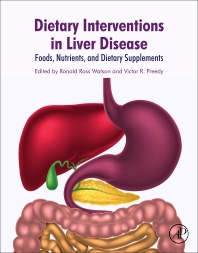LIMITED OFFER
Save 50% on book bundles
Immediately download your ebook while waiting for your print delivery. No promo code is needed.
Dietary Interventions in Liver Disease: Foods, Nutrients, and Dietary Supplements provides valuable insights into the agents that affect metabolism and other health-re… Read more

LIMITED OFFER
Immediately download your ebook while waiting for your print delivery. No promo code is needed.
Dietary Interventions in Liver Disease: Foods, Nutrients, and Dietary Supplements provides valuable insights into the agents that affect metabolism and other health-related conditions in the liver. It provides nutritional treatment options for those suffering from liver disease. Information is presented on a variety of foods, including herbs, fruits, soy and olive oil, thus illustrating that variations in intake can change antioxidant and disease preventing non-nutrients that affect liver health and/or disease promotion. This book is a valuable resource for biomedical researchers who focus on identifying the causes of liver diseases and food scientists targeting health-related product development.
Biomedical researchers who focus on identifying the causes of liver diseases as well as food scientists targeting health-related product development
1. Genome-Based Nutrition in Chronic Liver Disease
2. Current management and therapeutic strategies for alcoholic liver disease
3. Features of hepatic encephalopathy
4. The liver before and after bariatric surgery
5. Oxidative stress and dysfunction of the intracellular proteolytic machinery: a pathological hallmark of nonalcoholic fatty liver disease
B. Fruits Improves liver health
6. Polyphenols in the management of chronic liver diseases including hepatocellular carcinoma
7. Phytochemicals in the prevention of ethanol-induced hepatotoxicity: a revisit
8. Protective actions of polyphenols in the development of non-alcoholic fatty liver disease
9. Phytotherapy for the Liver
C. Herbs and plants for treating liver disease
10. Curcuma longa, the polyphenolic curcumin compound and pharmacological effect on liver
11. Nymphaea alba and liver protection
12. The Flavone Baicalein and its Use in Gastrointestinal Disease
13. Pyrroloquinoline quinone: Its profile and effects on the liver: implications for health and disease prevention
14. Herbal Weight Loss Supplements: from Dubious Efficacy to Direct Toxicity
15. Tea (Camellia sinensis L. Kuntze) as hepatoprotective agent: a revisit
16. Hepatoprotective Effects of the Indian Gooseberry (Emblica officinalis Gaertn): a revisit
D. Dietary macronutrients and micronutrients for healthy liver function
17. Dietary Interventions in Liver Disease
18. The effects of dietary advanced glycation end products (AGEs) on liver disorders
19. Molecular mechanisms of the protective role of wheat germ oil against oxidative stress-induced liver disease
20. Critical Role of Hepatic Fatty-acyl Phospholipid Remodeling in Obese and Non-Obese Fatty Liver Mouse Models
21. Vitamin D3 and liver protection
22. The Role of Carbohydrate Response Element Binding Protein in the Pathogenesis of Liver Disease
23. Dietary Interventions in Liver Disease: Foods, Nutrients, and Dietary Supplements
24. Fish Oil Supplements during Perinatal Life: Impact on the Liver of Offspring
25. Purple Rice Bran Improve Hepatic Insulin Signaling via Activation of Akt and Stabilization of IGF in Diabetic Rats
E. Toxic dietary materials including alcohol induced liver dysfunction: treatment
26. Heavy Metals and low oxygen microenvironment- its impact on liver metabolism and dietary supplementation
27. Cadmium and Fullerenes in Liver Diseases
28. Beneficial effects of natural compounds on heavy metal-induced hepatotoxicity
29. Nutritional and Dietary Intervention for Nonalcoholic Fatty Liver Disease
30. Dietary management of non-alcoholic fatty liver disease (NAFLD) by n-3 polyunsaturated fatty acid (PUFA) supplementation: A perspective on the role of n-3 PUFA-derived lipid mediators
RW
VP